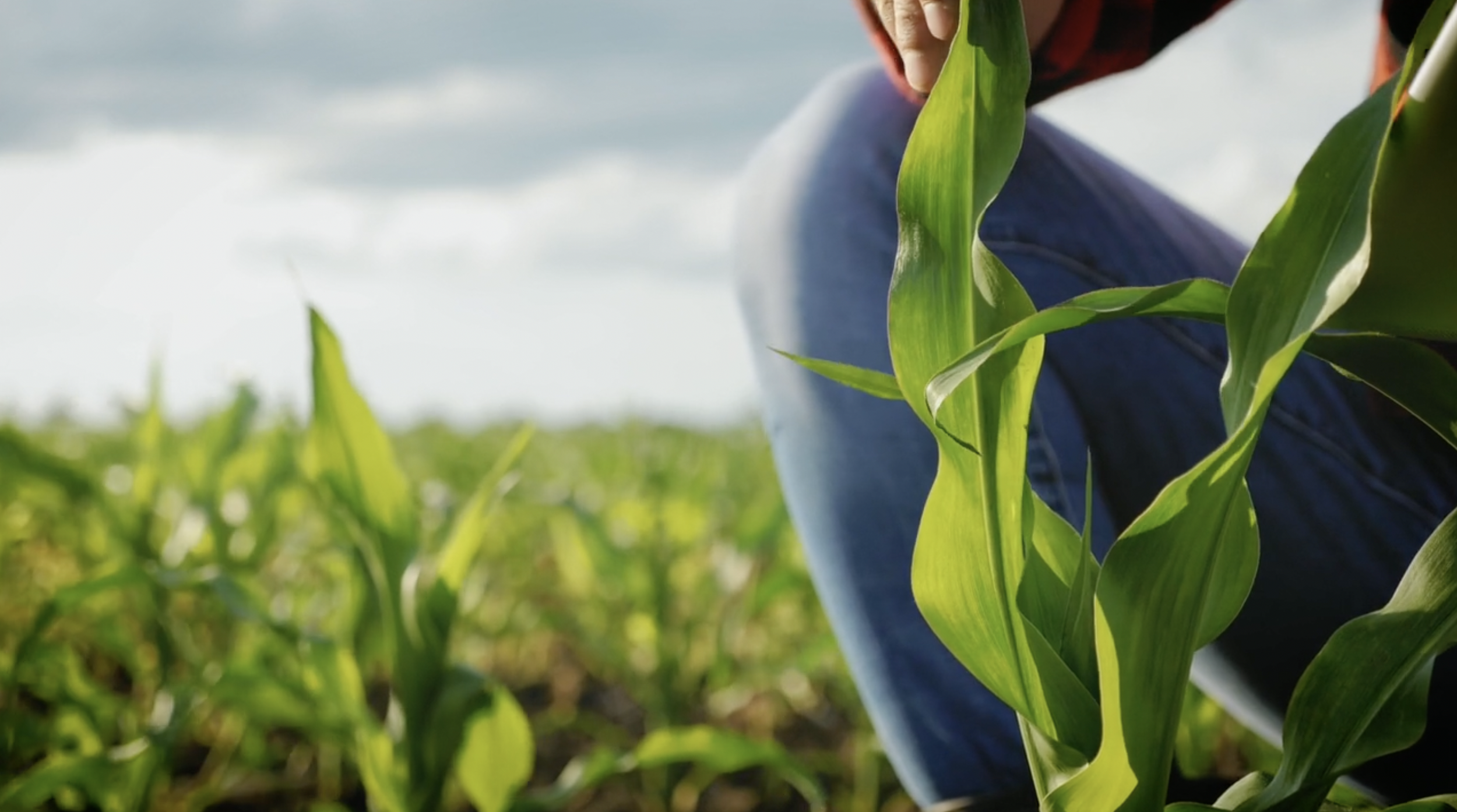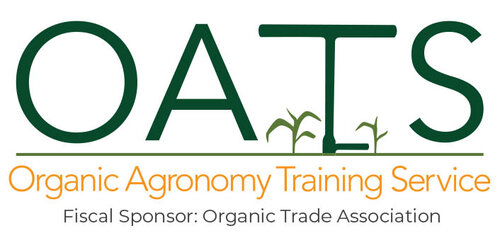
THE ORGANIC AGRICULTURE COURSE
Illinois Educators Cohort
Get prepared to help your farmers grow better crops, more efficiently, ecologically, and profitably
Deadline to Enroll: April 17, 2023
First Live Session: the week of May 1, 2023
Grow your network and learn at your own pace.
The Organic Agriculture Course by OATS provides a comprehensive training course for educators, advisors, consultants, agronomists, and agricultural professionals on the art and science of organic crop production.
This course will prepare you to work one-on-one with transitional and certified organic farmers. It provides high quality, science-based information that you need to advise your farmer clients.
The content for this course is adapted from the Organic Field Crop Course by OATS and tailored to the needs of the Illinois producers that you work with. The video lessons cover all aspects of organic field crop production in the northern tier of the United States. The guest presenters, exercises, examples, and written content expand the lessons to cover vegetables, fruit, and diversified farming practices.
Content in the Organic Agriculture Course is adapted from the Organic Field Crop Course by OATS
Get prepared to offer the following assistance:
Agronomic advising
Transition planning
Rotation planning and marketing support
Troubleshooting
Navigating certification
Record keeping
Moral support
What you will learn
This course provides a holistic understanding of organic crop production. Organic farms are complex systems and each decision affects numerous other aspects of the farm. You will understand the breadth of what organic farmers must balance when making decisions - not just agronomic considerations, but also marketing, management, and profitability - so that you can provide the best advice to your clients.
Systems thinking & long-term strategies for success in organic production
Managing risk during transition
Building strong crop rotations
Leveraging healthy soil for a healthy crop
Managing weeds, pests, & diseases
The certification process and record-keeping
National Organic Program (NOP) rules and regulations
Marketing and Profitability
Roles for organic advisors
What you get when you enroll
Deadline to Enroll: April 17, 2023
Expert course facilitator
48 self-paced video lessons
6 live, online sessions featuring guest speakers, Q&A, and discussion of lesson content - hosted March-September
Discussions with cohort of peers
Access to a wide network of organic field crop experts
Written content online
Supplementary materials for deeper dives
Lesson quizzes to test your learning
Exercises to put lessons into practice
1-day, in-person event held immediately before or after the U of I Extension Conference in November 2023
Final exam
Certificate of completion

The Organic Field Crop Course
Once you enroll, you will gain access to the course materials and join a cohort of your peers. You will move through the online, video-based lessons and course materials at your own pace. Each month, your course facilitator will host a live zoom session where your cohort will meet experienced organic farmers, researchers, and agricultural professionals, discuss the lesson content and activities, and get your questions answered.
Your facilitator will connect you with in-person events and working organic farms where you can get boots on the ground and turn principles into practice. Successful completion of the course (online content, live Zoom sessions, in-person event, and final exam) will earn you the Certificate of Completion for the OATS Organic Field Crop Course. This Certificate will show your clients and employers that you are knowledgeable about organic field crop farming.
Table of contents
-
1.1. Welcome to the course
1.2. Introduction to organic agriculture
1.3. Reasons for and against going organic
-
2.1. NOP structure and the rulemaking process
2.2. Top 7 regulations every advisor should know
-
3.1. What is healthy soil?
3.2. The organic fertility toolbox
3.3. Adding fertility with allowable inputs
-
4.1. Designing a crop rotation
4.2. Example crop rotations by region
4.3 Farmer perspectives on crop rotation
-
5.1. To till or not to till
5.2. Reducing tillage in organic systems
5.3. Focus farmer perspectives on no-till soybeans
-
6.1. There are weeds and then there are weeds: Organic weed control overview
6.2. Knowing your weeds
6.3. Keep weeds from emerging
6.4. Killing the weeds that do emerge part 1
6.5. Killing the weeds that do emerge part 2
6.6. Long term control
6.7. Focus farmer’s perspective on flame weeding with Jerry M.
6.8. Focus farmer’s perspective on blind cultivation
6.9. Focus farmer’s perspective on cultivars and alternative tools
6.10. Focus farmer’s perspective on weed control timelines
-
7.1. Ecological perspective on pests and disease
7.2. Cultural control strategies
7.3. Control by inputs
7.4. Farmer perspectives on pest & disease management
-
8.1. The certification process summarized
8.2. Completing the Organic System Plan (OSP)
8.3. The inspection
8.4. Record keeping overview
8.5. Audits
8.6. Parallel or split operations
8.7. How to lose your organic certificate
8.8. Farmer perspectives on parallel operations
-
9.1. Preparing for transition
9.2. Strategies for managing transition
9.3. Transition scenarios
9.4. The economics of transition
-
10.1. Harvest considerations
10.2. Keeping grain in condition
-
11.1. Organic financials
11.2. Organic grain marketing 101
-
12.1. Agronomic services
12.2. Record keeping & certification services
12.3. Agronomists’ perspectives on organic advising
12.4. Where to go from here
Meet the Teachers
-

Katie Bishop
COURSE FACILITATOR
Katie Bishop, along with her husband Hans and her talented team, farm 400+ acres of organic vegetables and grain in central Illinois. Katie is the go-to for all things veggie from transplant sales to CSA, wholesale accounts and community outreach programs. She works hard with the community to make sure local and organic food is accessible by all. In 2022 Katie broadened her reach, becoming a leadership consultant and coach for farmers who want strong teams and greater balance in their lives.
-

Nate Powell-Palm
VIDEO-LESSON HOST
Powell-Palm first landed in the world of organics in 2008 when he applied for and received organic certification from the Montana Dept of Agriculture. He currently farms certified organic grains, forages, pulse crops and oil seeds on 1075 acres. A diversified operation, Powell-Palm runs a cow-calf herd along with his crops, retaining all calves to finish on grass, cover crops and crop stubble. Since 2012, Nate has worked as an organic farm, livestock and processing inspector, contracting with certification agencies around the United States to inspect all scopes of organic agriculture. Nate has served as both the Vice President and President of the Montana Organic Producers Coop, a 22 member certified organic, grass-fed beef marketing cooperative. He currently serves on the governing council of the Organic Farmers Association and is a member of the Organic Trade Association Farmers Advisory Council. Since 2019, Nate has served in the farmer seat of the National Organic Standards Board. Nate holds a B.S. in Environmental Science from Montana State University.
Featured Farmers
-

John Wepking
WISCONSIN
-

John Wicks
MONTANA
-

Rick Mittleider
NORTH DAKOTA
-

Jason Federer
INDIANA
-

Michael O’Donnell
INDIANA
-

Harold Wilken
ILLINOIS
-

Boyd Charles
Saskatchewan
-

Eric Madsen
IOWA
-

Jerry Matzner
MINNESOTA
-

Tom Cotter
Minnesota
Subject Matter Experts
-

Adam Davis
Chair of Crop Sciences at University of Illinois Urbana-Champaign
-

Paul Dietmann
Compeer Financial
-

Bryce Irlbeck
AgriSecure
-

Colin Wiegman
Merchandising Expert
-

Joseph Kibiwott
Timeless Food
-

Léa Vereecke
Rodale Institute
-

Steven Mirsky
USDA-ARS
-

Ryan Schmid
Schmid Ecdysis Foundation
-

Margaret Smith
Albert Lea Seed
FAQs
-
The online modules use TalentLMS. They can be viewed on any internet connected laptop, desktop, or mobile device. The course also has a mobile app (available from Google Play and and the App Store) so you can keep learning when you are on the go.
-
We estimate that each lesson will take approximately 25 minutes to complete. This includes reading the online written materials, viewing the 7-15 minute instructional video, and taking the lesson quiz. We estimate that total time investment for the full course (online content, exercises, Zoom sessions, in-person event, and final exam) requires 40 hours to complete. The zoom sessions meet once a month for 6 months.
-
You have access to the course content for 12 months from your date of enrollment.
-
We do not have any formal prerequisites to take this course. We recommend that you have an understanding of general agriculture principles and experience working in agriculture. This course assumes prior knowledge of field crop production practices and offers an extension of that knowledge into organic-specific practices and requirements.
-
After completing the online materials, quizzes, exercises, live zoom sessions, in-person event, and achieving a passing score on the course final exam, you are eligible to receive the OATS Organic Field Crop Course Certificate of Completion. Certificates are non-accredited.
Participants are eligible to receive Certified Crop Advisor (CCA) continuing education units (CEUs).
-
Contact training@organicagronomy.org to learn more.
“Take this information to other agronomists across the US.”
— Participant at 2019 pilot training

